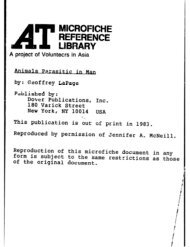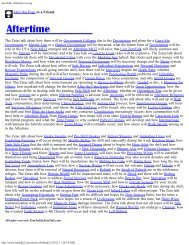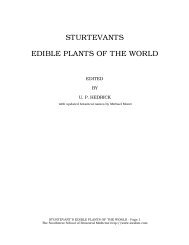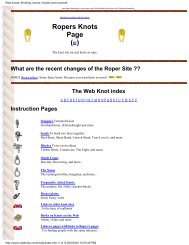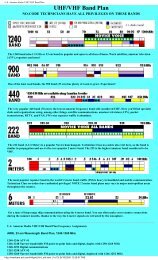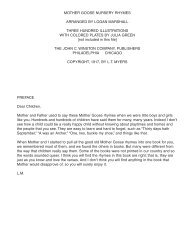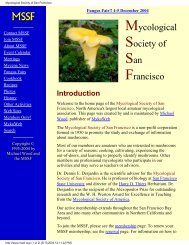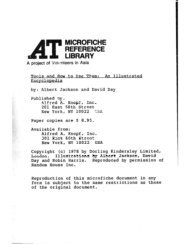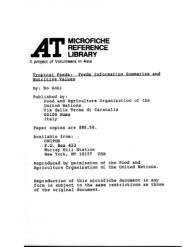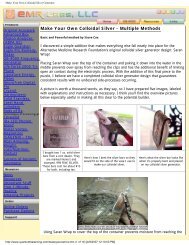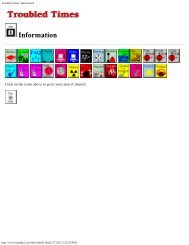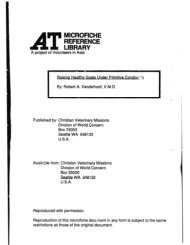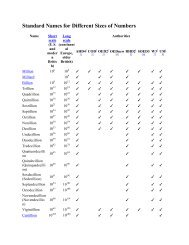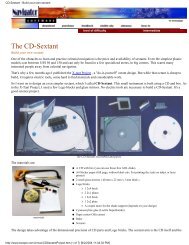- Page 1 and 2:
Everything Herbal - Main Page Searc
- Page 3 and 4:
HerbNET - The most comprehensive si
- Page 5 and 6:
Ask the Herbalist Search HerbNET fo
- Page 7 and 8:
Ask the Herbalist *Heart & Circulat
- Page 9 and 10:
HerbNET - Associations - Internatio
- Page 11 and 12:
HerbNET - Associations - Internatio
- Page 13 and 14:
HerbNET - Associations - Internatio
- Page 15 and 16:
HerbNET - Calendar - International
- Page 17 and 18:
HerbNET - Calendar - International
- Page 19 and 20:
Language Translation Table for Herb
- Page 21 and 22:
Language Translation Table for Herb
- Page 23 and 24:
Language Translation Table for Herb
- Page 25 and 26:
Language Translation Table for Herb
- Page 27 and 28:
Language Translation Table for Herb
- Page 29 and 30:
Language Translation Table for Herb
- Page 31 and 32:
HerbNET - Gardens - International S
- Page 33 and 34:
HerbNET - Gardens - International R
- Page 35 and 36:
Herb Uses - A, B Herbs cardioactive
- Page 37 and 38:
Herb Uses - A, B Herbs similar purp
- Page 39 and 40:
Herb Uses - A, B Herbs for painful
- Page 41 and 42:
Herb Uses - A, B Herbs Indian lobel
- Page 43 and 44:
Herb Uses - A, B Herbs Balsam Fir (
- Page 45 and 46:
Herb Uses - A, B Herbs progression
- Page 47 and 48:
Herb Uses - A, B Herbs milk. Blesse
- Page 49 and 50:
Herb Uses - A, B Herbs was an ingre
- Page 51 and 52:
HerbQuest Welcome © HerbNET, 1996-
- Page 53 and 54:
Herbal Exchange--Herbal Classifed A
- Page 55 and 56:
Herbal Exchange--Herbal Classifed A
- Page 57 and 58:
Herbal Exchange--Herbal Classifed A
- Page 59 and 60:
Herbal Exchange--Herbal Classifed A
- Page 61 and 62:
Herbal Exchange--Herbal Classifed A
- Page 63 and 64:
Herb World -- The Herbal Green Page
- Page 65 and 66:
Site of the Herb Growing & Marketin
- Page 67 and 68:
Site of the Herb Growing & Marketin
- Page 69 and 70:
Site of the Herb Growing & Marketin
- Page 71 and 72:
Herbalpedia herbs, culinary herbs a
- Page 73 and 74:
HerbNET - Magazine - Letter From th
- Page 75 and 76:
HerbNET - Potpourri--Informational
- Page 77 and 78:
HerbNET - Potpourri--Informational
- Page 79 and 80:
HerbNET - Potpourri--Informational
- Page 81 and 82:
HerbNET - Potpourri--Informational
- Page 83 and 84:
HerbNET - Potpourri--Informational
- Page 85 and 86:
HerbNET - Potpourri--Informational
- Page 87 and 88:
HerbNET - Practitioners - United St
- Page 89 and 90:
HerbNET - Practitioners - United St
- Page 91 and 92:
HerbNET - Practitioners - United St
- Page 93 and 94:
HerbNET - Practitioners - United St
- Page 95 and 96:
HerbNET - Practitioners - United St
- Page 97 and 98:
HerbNET - Press - Book Reviews (A-E
- Page 99 and 100:
HerbNET - Press - Book Reviews (A-E
- Page 101 and 102:
HerbNET - Press - Book Reviews (A-E
- Page 103 and 104:
HerbNET - Press - Book Reviews (A-E
- Page 105 and 106:
HerbNET - Press - Book Reviews (A-E
- Page 107 and 108:
HerbNET - Services Payment: Payment
- Page 109 and 110:
HerbNET - Shoppe - Aromatherapy/Ess
- Page 111 and 112:
HerbNET - Source - A Search HerbNET
- Page 113 and 114:
HerbNET - Source - A graveolens 'Bo
- Page 115 and 116:
HerbNET - University - Internationa
- Page 117 and 118:
HerbNET - University - Internationa
- Page 119 and 120:
ZDNet AnchorDesk Bargain burner Son
- Page 121 and 122:
We have redesigned our site and the
- Page 123 and 124:
Internet Explorer Downloads http://
- Page 125 and 126:
Recreational Software Advisory Coun
- Page 127 and 128:
Welcome Welcome to the Web Site of
- Page 129 and 130:
LINKS TO FRIENDS We specialize in s
- Page 131 and 132:
Mountain Rose Herbs | Bulk organic
- Page 133 and 134:
All Goode Gifts.....customized herb
- Page 135 and 136:
Ask the Herbalist_questions on Alco
- Page 137 and 138:
Ask the Herbalist_questions on Alle
- Page 139 and 140:
Ask the Herbalist_questions on Alop
- Page 141 and 142:
Ask the Herbalist_Using Herbs with
- Page 143 and 144:
Ask the Herbalist_questions on Arth
- Page 145 and 146:
Ask the Herbalist_questions on Arth
- Page 147 and 148:
Ask the Herbalist_questions on athl
- Page 149 and 150:
Ask the Herbalist_questions on Avas
- Page 151 and 152:
Ask the Herbalist_questions on bad
- Page 153 and 154:
Ask the Herbalist_questions Search
- Page 155 and 156:
Ask the Herbalist_questions on Brok
- Page 157 and 158:
Ask the Herbalist_questions on canc
- Page 159 and 160:
Ask the Herbalist_questions on canc
- Page 161 and 162:
Ask the Herbalist_questions on canc
- Page 163 and 164:
Ask the Herbalist_questions on brea
- Page 165 and 166:
Ask the Herbalist_questions on brea
- Page 167 and 168:
Ask the Herbalist_questions on brea
- Page 169 and 170:
Ask the Herbalist_questions on Herb
- Page 171 and 172:
Ask the Herbalist_questions on Corn
- Page 173 and 174:
Ask the Herbalist_questions on cyst
- Page 175 and 176:
Ask the Herbalist_questions on Dent
- Page 177 and 178:
Ask the Herbalist_questions on Diab
- Page 179 and 180:
Ask the Herbalist_questions on Diab
- Page 181 and 182:
Ask the Herbalist_questions on Dige
- Page 183 and 184:
Ask the Herbalist_questions on Ear
- Page 185 and 186:
Ask the Herbalist_questions on emot
- Page 187 and 188:
Ask the Herbalist_questions on emot
- Page 189 and 190:
Ask the Herbalist_questions on emot
- Page 191 and 192:
Ask the Herbalist_questions on Herb
- Page 193 and 194:
Ask the Herbalist_questions on Eye
- Page 195 and 196:
Ask the Herbalist_questions on Eye
- Page 197 and 198:
Ask the Herbalist_questions on Fibr
- Page 199 and 200:
Ask the Herbalist_questions on Fung
- Page 201 and 202:
Ask the Herbalist_questions on Hair
- Page 203 and 204:
Ask the Herbalist_questions on Hair
- Page 205 and 206:
Ask the Herbalist_questions on Tinn
- Page 207 and 208:
Ask the Herbalist_questions on Hear
- Page 209 and 210:
Ask the Herbalist_questions on Hear
- Page 211 and 212:
Ask the Herbalist_questions on hemo
- Page 213 and 214:
Ask the Herbalist_questions on Hepa
- Page 215 and 216:
Ask the Herbalist_questions on Hern
- Page 217 and 218:
Ask the Herbalist_questions on Hern
- Page 219 and 220:
Ask the Herbalist_questions on Herb
- Page 221 and 222:
Ask the Herbalist_questions on HIV/
- Page 223 and 224:
Ask the Herbalist_questions on Hype
- Page 225 and 226:
Ask the Herbalist_questions on Inso
- Page 227 and 228:
Ask the Herbalist_questions Your qu
- Page 229 and 230:
Ask the Herbalist_questions on lice
- Page 231 and 232:
Ask the Herbalist_questions on Live
- Page 233 and 234:
Ask the Herbalist_questions on lupu
- Page 235 and 236:
Ask the Herbalist_questions on Mala
- Page 237 and 238:
Ask the Herbalist_questions on migr
- Page 239 and 240:
Ask the Herbalist_questions on Musc
- Page 241 and 242:
Ask the Herbalist_questions on Mono
- Page 243 and 244:
Ask the Herbalist_questions on the
- Page 245 and 246:
Ask the Herbalist_questions on Nutr
- Page 247 and 248:
Ask the Herbalist-Questions on bein
- Page 249 and 250:
Ask the Herbalist_questions on Plan
- Page 251 and 252:
Ask the Herbalist_questions on Preg
- Page 253 and 254:
Ask the Herbalist_questions on Preg
- Page 255 and 256: Ask the Herbalist_questions on Preg
- Page 257 and 258: Ask the Herbalist_questions on Preg
- Page 259 and 260: Ask the Herbalist_questions on Preg
- Page 261 and 262: Ask the Herbalist_questions on Preg
- Page 263 and 264: Ask the Herbalist_questions on Preg
- Page 265 and 266: Ask the Herbalist_questions on Preg
- Page 267 and 268: Ask the Herbalist_questions on Preg
- Page 269 and 270: Ask the Herbalist_questions on Pros
- Page 271 and 272: Ask the Herbalist_questions on Resp
- Page 273 and 274: Ask the Herbalist_questions on Resp
- Page 275 and 276: Ask the Herbalist_questions on RSD
- Page 277 and 278: Ask the Herbalist_questions on scar
- Page 279 and 280: Ask the Herbalist_questions on Sexu
- Page 281 and 282: Ask the Herbalist_questions on Sexu
- Page 283 and 284: Ask the Herbalist_questions on Sexu
- Page 285 and 286: Ask the Herbalist_questions Search
- Page 287 and 288: Ask the Herbalist_questions Search
- Page 289 and 290: Ask the Herbalist_questions and for
- Page 291 and 292: Ask the Herbalist_questions Additio
- Page 293 and 294: Ask the Herbalist_questions FORMACA
- Page 295 and 296: Ask the Herbalist_questions Use a v
- Page 297 and 298: Ask the Herbalist_questions In gene
- Page 299 and 300: Ask the Herbalist_questions http://
- Page 301 and 302: Ask the Herbalist_questions on Smok
- Page 303 and 304: Specific Vitamins, Herbs, Medicatio
- Page 305: Specific Vitamins, Herbs, Medicatio
- Page 309 and 310: Specific Vitamins, Herbs, Medicatio
- Page 311 and 312: Specific Vitamins, Herbs, Medicatio
- Page 313 and 314: Specific Vitamins, Herbs, Medicatio
- Page 315 and 316: Specific Vitamins, Herbs, Medicatio
- Page 317 and 318: Specific Vitamins, Herbs, Medicatio
- Page 319 and 320: Specific Vitamins, Herbs, Medicatio
- Page 321 and 322: Specific Vitamins, Herbs, Medicatio
- Page 323 and 324: Specific Vitamins, Herbs, Medicatio
- Page 325 and 326: Specific Vitamins, Herbs, Medicatio
- Page 327 and 328: Specific Vitamins, Herbs, Medicatio
- Page 329 and 330: Specific Vitamins, Herbs, Medicatio
- Page 331 and 332: Specific Vitamins, Herbs, Medicatio
- Page 333 and 334: Specific Vitamins, Herbs, Medicatio
- Page 335 and 336: Specific Vitamins, Herbs, Medicatio
- Page 337 and 338: Specific Vitamins, Herbs, Medicatio
- Page 339 and 340: Specific Vitamins, Herbs, Medicatio
- Page 341 and 342: Specific Vitamins, Herbs, Medicatio
- Page 343 and 344: Specific Vitamins, Herbs, Medicatio
- Page 345 and 346: Specific Vitamins, Herbs, Medicatio
- Page 347 and 348: Specific Vitamins, Herbs, Medicatio
- Page 349 and 350: Ask the Herbalist_questions on STDs
- Page 351 and 352: Ask the Herbalist_questions on STDs
- Page 353 and 354: Ask the Herbalist_questions on STDs
- Page 355 and 356: Ask the Herbalist_questions on Stre
- Page 357 and 358:
Ask the Herbalist_questions on swea
- Page 359 and 360:
Ask the Herbalist_questions on swel
- Page 361 and 362:
Ask the Herbalist_questions on Thro
- Page 363 and 364:
Ask the Herbalist_questions on Thru
- Page 365 and 366:
Ask the Herbalist_questions on Thyr
- Page 367 and 368:
Ask the Herbalist_questions on Urin
- Page 369 and 370:
Ask the Herbalist_questions on vari
- Page 371 and 372:
Ask the Herbalist_questions on vari
- Page 373 and 374:
Ask the Herbalist_questions on weig
- Page 375 and 376:
Ask the Herbalist_questions on weig
- Page 377 and 378:
Ask the Herbalist_questions on weig
- Page 379 and 380:
Ask the Herbalist_questions on Wild
- Page 381 and 382:
Ask the Herbalist_questions on Wome
- Page 383 and 384:
Ask the Herbalist_questions on Wome
- Page 385 and 386:
Ask the Herbalist_questions on Wome
- Page 387 and 388:
Ask the Herbalist_questions on Wome
- Page 389 and 390:
Ask the Herbalist_questions on Wome
- Page 391 and 392:
Ask the Herbalist_questions on Wome
- Page 393 and 394:
Ask the Herbalist_questions on Wome
- Page 395 and 396:
Ask the Herbalist_questions on Yeas
- Page 397 and 398:
HerbNET - Shoppe - Ayurvedic Herbs
- Page 399 and 400:
HERBALPEDIA Allium sativum [AL-ee-u
- Page 401 and 402:
TCM: Expels internal cold and inter
- Page 403 and 404:
3 lbs potatoes, scrubbed but do not
- Page 405 and 406:
HERBALPEDIA Ocimum basilicum [OSS-i
- Page 407 and 408:
CIRCULATION, MUSCLES AND JOINTS: go
- Page 409 and 410:
minutes. This is one case where mor
- Page 411 and 412:
Wash the salad greens well and spin
- Page 413 and 414:
metal spoon, about 5 minutes. Remov
- Page 415 and 416:
The Complete Book of Herbs, Spices
- Page 417 and 418:
temperature of 70-75F. Soil should
- Page 419 and 420:
Resources: Companion Plants, 7247 N
- Page 421 and 422:
Herbalpedia_Echinacea Photo http://
- Page 423 and 424:
Roses Meridians/Organs affected: (p
- Page 425 and 426:
Roses Distillation: Extracted by st
- Page 427 and 428:
Roses Mexican Rose Olé 1 cup red r
- Page 429 and 430:
Roses the mixture resembles a coars
- Page 431 and 432:
Roses 3 tsp baking powder 1 Tbsp su
- Page 433 and 434:
Roses 2 Tbsp rose water Gently simm
- Page 435 and 436:
Roses The Encyclopaedia of Essentia
- Page 437 and 438:
English herbalists believed that in
- Page 439 and 440:
Skin: Good for cuts and wounds; see
- Page 441 and 442:
Sage Flower Pesto 2 cups sage flowe
- Page 443 and 444:
Place squash cut side down in pyrex
- Page 445 and 446:
salt and freshly ground pepper to t
- Page 447 and 448:
Herbalpedia_Sage Photo Search HerbN
- Page 449 and 450:
Lemon Balm HERBALPEDIA Melissa offi
- Page 451 and 452:
Lemon Balm as ointment or gentle ma
- Page 453 and 454:
Lemon Balm ½ inch piece ginger, pe
- Page 455 and 456:
Lemon Balm Herb and Vegetable Stir-
- Page 457 and 458:
Lemon Balm http://www.herbworld.com
- Page 459 and 460:
damaging the roots when you bring i
- Page 461 and 462:
Take the tincture as a stimulant to
- Page 463 and 464:
1 oz nettle leaf ½ oz black walnut
- Page 465 and 466:
Fresh Berry and Rosemary Fool 1 cup
- Page 467 and 468:
Toppings: 2 tomatoes, sliced paper-
- Page 469 and 470:
cover, and let stand for at least 4
- Page 471 and 472:
Edible Flowers From Garden To Palat
- Page 473 and 474:
part sterilized, baked clay frit (k
- Page 475 and 476:
1/3 cup thyme Lavender - is relaxin
- Page 477 and 478:
and form a little cage around flowe
- Page 479 and 480:
tender. Drain and refresh. Pat dry.
- Page 481 and 482:
1 tsp Tellicherry peppercorns, crac
- Page 483 and 484:
thickened and a jelling point is re
- Page 485 and 486:
saucepan. In a large bowl, whisk th
- Page 487 and 488:
INDEX FOR 2004 HERBALPEDIA Abelmosc
- Page 489 and 490:
Asarum sieboldii—Xi Xin Asimina t
- Page 491 and 492:
Cistus ladanifer--Rockrose Citrullu
- Page 493 and 494:
Eruca sativa—Sweet Rocket Ervatam
- Page 495 and 496:
Iris chinensis - Leopard Lily Iris
- Page 497 and 498:
Narcissus pseudonarcissus--Daffodil
- Page 499 and 500:
Prunus mume—Japanese apricot Prun
- Page 501 and 502:
Sonchus asper - Field Sow Thistle S
- Page 503 and 504:
Adobe Systems Incorporated Skip nav
- Page 505 and 506:
Adobe Systems Incorporated ● ●
- Page 507 and 508:
HerbNET - Magazine - Profile of Chi
- Page 509 and 510:
HerbNET - Magazine - Profile of Chi
- Page 511 and 512:
HerbNET - Magazine - Profile of Pri
- Page 513 and 514:
HerbNET - Magazine - Profile of Pri
- Page 515 and 516:
HerbNET - Magazine - Profile of Per
- Page 517 and 518:
HerbNET - Magazine - Profile of Per
- Page 519 and 520:
HerbNET - Magazine - Profile of Jap
- Page 521 and 522:
HerbNET - Magazine - Profile of Jap
- Page 523 and 524:
HerbNET - Magazine - Profile of Pri
- Page 525 and 526:
HerbNET - Magazine - Profile of Pri
- Page 527 and 528:
HerbNET - Magazine - Profile of Pep
- Page 529 and 530:
HerbNET - Magazine - Profile of Pap
- Page 531 and 532:
HerbNET - Magazine - Profile of Pap
- Page 533 and 534:
HerbNET - Magazine - Spring Means T
- Page 535 and 536:
HerbNET - Magazine - Spring Means T
- Page 537 and 538:
HerbNET - Magazine - Letter From th
- Page 539 and 540:
HerbNET - Magazine - Letter from th
- Page 541 and 542:
HerbNET - Magazine - Letter From th
- Page 543 and 544:
paherbfest.com 6th Annual PA Herb F
- Page 545 and 546:
Richters Issues Page Richters Home
- Page 547 and 548:
Richters Issues Page Media reports,
- Page 549 and 550:
Richters Issues Page of CSOMA's cal
- Page 551 and 552:
Growing & Selling Fresh-Cut Herbs H
- Page 553 and 554:
Welcome to Long Creek Herbs Online!
- Page 555 and 556:
Aromatherapy: healing with pure Ess
- Page 557 and 558:
Herb Business Conference--herb grow
- Page 559 and 560:
HerbNET - Source - B Search HerbNET
- Page 561 and 562:
HerbNET - Source - C Search HerbNET
- Page 563 and 564:
HerbNET - Source - C limon Lemon 3,
- Page 565 and 566:
HerbNET - Source - D Search HerbNET
- Page 567 and 568:
HerbNET - Source - E Erysimum linif
- Page 569 and 570:
HerbNET - Source - G Search HerbNET
- Page 571 and 572:
HerbNET - Source - H Search HerbNET
- Page 573 and 574:
HerbNET - Source - I Search HerbNET
- Page 575 and 576:
HerbNET - Source - K Search HerbNET
- Page 577 and 578:
HerbNET - Source - L intermedia 'Pr
- Page 579 and 580:
HerbNET - Source - M Search HerbNET
- Page 581 and 582:
HerbNET - Source - M Myroxylon peri
- Page 583 and 584:
HerbNET - Source - O Search HerbNET
- Page 585 and 586:
HerbNET - Source - O http://www.her
- Page 587 and 588:
HerbNET - Source - P cv. Chocolate
- Page 589 and 590:
HerbNET - Source - P Pulmonaria off
- Page 591 and 592:
HerbNET - Source - R officinalis cv
- Page 593 and 594:
HerbNET - Source - S judaica Judean
- Page 595 and 596:
HerbNET - Source - T Search HerbNET
- Page 597 and 598:
HerbNET - Source - T vulgaris cv. O
- Page 599 and 600:
HerbNET - Source - V Search HerbNET
- Page 601 and 602:
HerbNET - Source - W Search HerbNET
- Page 603 and 604:
HerbNET - Source - Z Search HerbNET
- Page 605 and 606:
Lingle's Herbs Offers the Finest He
- Page 607 and 608:
Lingle's Herbs Offers the Finest He
- Page 609 and 610:
Medicinal Herbs and Herb Plants Nur
- Page 611 and 612:
Hill Woman Home Page Hill Woman Pro
- Page 613 and 614:
Hill Woman Home Page Updated 5/5/20
- Page 615 and 616:
Essential Oils, Aromatherapy, Soap
- Page 617 and 618:
Herb Uses - C, D, E Herbs ringworm,
- Page 619 and 620:
Herb Uses - C, D, E Herbs medicine
- Page 621 and 622:
Herb Uses - C, D, E Herbs painful a
- Page 623 and 624:
Herb Uses - C, D, E Herbs similar t
- Page 625 and 626:
Herb Uses - C, D, E Herbs Cocklebur
- Page 627 and 628:
Herb Uses - C, D, E Herbs Couch gra
- Page 629 and 630:
Herb Uses - C, D, E Herbs Smoked in
- Page 631 and 632:
Herb Uses - C, D, E Herbs Root weak
- Page 633 and 634:
Herb Uses - C, D, E Herbs monks use
- Page 635 and 636:
Herb Uses -F, G, H Herbs Search Her
- Page 637 and 638:
Herb Uses -F, G, H Herbs The herb a
- Page 639 and 640:
Herb Uses -F, G, H Herbs although t
- Page 641 and 642:
Herb Uses -F, G, H Herbs reduce exc
- Page 643 and 644:
Herb Uses -F, G, H Herbs immunostim
- Page 645 and 646:
Herb Uses -F, G, H Herbs The seeds
- Page 647 and 648:
Herb Uses I, J, K- Herbs Search Her
- Page 649 and 650:
Herb Uses I, J, K- Herbs diuretic e
- Page 651 and 652:
Herb Uses I, J, K- Herbs http://www
- Page 653 and 654:
Herb Uses -O, P, Q Herbs soothe irr
- Page 655 and 656:
Herb Uses -O, P, Q Herbs Tail (Leon
- Page 657 and 658:
Herb Uses -O, P, Q Herbs for Insuli
- Page 659 and 660:
Herb Uses -O, P, Q Herbs Mexican Po
- Page 661 and 662:
Herb Uses -O, P, Q Herbs It is impo
- Page 663 and 664:
Herb Uses -O, P, Q Herbs (Spain); b
- Page 665 and 666:
Herb Uses -O, P, Q Herbs decrease f
- Page 667 and 668:
Herb Uses -O, P, Q Herbs order to p
- Page 669 and 670:
Herb Uses -O, P, Q Herbs relieve so
- Page 671 and 672:
Herb Uses R, S, T Herbs Search Herb
- Page 673 and 674:
Herb Uses R, S, T Herbs of a salve
- Page 675 and 676:
Herb Uses R, S, T Herbs profoundly
- Page 677 and 678:
Herb Uses R, S, T Herbs Saffron (Cr
- Page 679 and 680:
Herb Uses R, S, T Herbs beneficial
- Page 681 and 682:
Herb Uses R, S, T Herbs digestive p
- Page 683 and 684:
Herb Uses R, S, T Herbs Showy Milkw
- Page 685 and 686:
Herb Uses R, S, T Herbs toxins from
- Page 687 and 688:
Herb Uses R, S, T Herbs tonic, and
- Page 689 and 690:
Herb Uses R, S, T Herbs Strychnine.
- Page 691 and 692:
Herb Uses R, S, T Herbs decrease fl
- Page 693 and 694:
Herb Uses R, S, T Herbs 1990 showed
- Page 695 and 696:
Herb Uses R, S, T Herbs leaves has
- Page 697 and 698:
Herb Uses U-Z Herbs Search HerbNET
- Page 699 and 700:
Herb Uses U-Z Herbs condition, a qu
- Page 701 and 702:
Herb Uses U-Z Herbs arthritis and r
- Page 703 and 704:
Herb Uses U-Z Herbs Wood Sage (Teuc
- Page 705 and 706:
Herb Uses U-Z Herbs herbal preparat
- Page 707 and 708:
Herb Uses U-Z Herbs Zhi Mi (Anemarr
- Page 709 and 710:
HerbNET - Shoppe - Body / Personal
- Page 711 and 712:
HerbNET - Shoppe - Body / Personal
- Page 713 and 714:
HerbNET - Shoppe - Books profession
- Page 715 and 716:
HerbNET - Shoppe - Candles & Crafts
- Page 717 and 718:
HerbNET - Shoppe - Chinese Herbs As
- Page 719 and 720:
HerbNET - Shoppe - Clip Art & Print
- Page 721 and 722:
HerbNET - Shoppe - Clothing http://
- Page 723 and 724:
HerbNET - Shoppe - Computer Softwar
- Page 725 and 726:
HerbNET - Shoppe - Dried/Preserved
- Page 727 and 728:
HerbNET - Shoppe - Eats & Drinks Lo
- Page 729 and 730:
HerbNET - Shoppe - Garden/Farming S
- Page 731 and 732:
HerbNET - Shoppe - Generally Herbs
- Page 733 and 734:
HerbNET - Shoppe - Generally Herbs
- Page 735 and 736:
HerbNET - Shoppe - Generally Herbs
- Page 737 and 738:
HerbNET - Shoppe - Ginseng no where
- Page 739 and 740:
HerbNET - Shoppe - Gifts/Greeting C
- Page 741 and 742:
HerbNET - Shoppe - Health Services
- Page 743 and 744:
HerbNET - Shoppe - Herbal Retreats,
- Page 745 and 746:
HerbNET - Shoppe - Herbal Weddings
- Page 747 and 748:
HerbNET - Shoppe - Herbalists' Supp
- Page 749 and 750:
HerbNET - Shoppe - Herbs for Health
- Page 751 and 752:
HerbNET - Shoppe - Herbs for Health
- Page 753 and 754:
HerbNET - Shoppe - Herbs for Pets S
- Page 755 and 756:
HerbNET - Shoppe - Manufacturing Eq
- Page 757 and 758:
HerbNET - Shoppe - Multi-Level Mark
- Page 759 and 760:
HerbNET - Shoppe - Non-Herbal Healt
- Page 761 and 762:
HerbNET - Shoppe - Plants Search He
- Page 763 and 764:
HerbNET - Shoppe - Plants antique r
- Page 765 and 766:
HerbNET - Shoppe - Restaurants, Tea
- Page 767 and 768:
HerbNET - Shoppe - Seeds Cariboo Gi
- Page 769 and 770:
Ayurveda help through ayurveda cons
- Page 771 and 772:
Ayurveda Ayurvedic Medicine Alterna
- Page 773 and 774:
Ayurveda Ayurvedic Medicine Alterna
- Page 775 and 776:
Ayurveda Holistic Center: School, O
- Page 777 and 778:
Trade Technocrats Ltd. - Herbs and
- Page 779 and 780:
Language Translation Table for Herb
- Page 781 and 782:
Language Translation Table for Herb
- Page 783 and 784:
Language Translation Table for Herb
- Page 785 and 786:
Language Translation Table for Herb
- Page 787 and 788:
Language Translation Table for Herb
- Page 789 and 790:
Language Translation Table for Herb
- Page 791 and 792:
Language Translation Table for Herb
- Page 793 and 794:
Soap Making Supplies | Cosmetic Bas
- Page 795 and 796:
Welcome to Akahdahmah Herbs - Herba
- Page 797 and 798:
Herb World -- About Us http://www.h
- Page 799 and 800:
Herb World -- Speaker Bureau BUSINE
- Page 801 and 802:
Herb World -- Herbal Recipes HOME A
- Page 803 and 804:
cattoyz.net Choose from three style
- Page 805 and 806:
cattoyz.net http://www.cattoyz.net/
- Page 807 and 808:
Herbs of the World ~ Tara Miliziano
- Page 809 and 810:
Herbs of the World http://www.equi-
- Page 811 and 812:
Welcome to Miris, Inc. Aromatherapy
- Page 813 and 814:
Welcome to Dorothy Biddle Service O
- Page 815 and 816:
Bottles, Jars and Vials: Glass and
- Page 817 and 818:
- : Main Shop Main Shop A | B | C |
- Page 819 and 820:
Rare and Unusual Medicinal Herbs fo
- Page 821 and 822:
Rare and Unusual Medicinal Herbs fo
- Page 823 and 824:
Medicinal Herb Plants - Free Herb P
- Page 825 and 826:
GARLIC - Herb of the Year DIRECTORY
- Page 827 and 828:
Medicinal Herbs Books - Recommended
- Page 829 and 830:
Medicinal Herbs Books - Recommended
- Page 831 and 832:
Medicinal Herbs Books - Recommended
- Page 833 and 834:
Medicinal Herbs Books - Recommended
- Page 835 and 836:
Medicinal Herb Plants FAQS Medicina
- Page 837 and 838:
Medicinal Herb Plants FAQS Phone Or
- Page 839 and 840:
Crimson Sage Nursery - Medicinal He
- Page 841 and 842:
Crimson Sage Nursery - Medicinal He
- Page 843 and 844:
Crimson Sage Nursery - Medicinal He
- Page 845 and 846:
Medicinal Herb Plants Nursery Conta
- Page 847 and 848:
Medicinal Herb Plants Nursery Conta
- Page 849 and 850:
Medicinal Herb Plants Nursery Conta
- Page 851 and 852:
Medicinal Herb Plants Nursery Conta
- Page 853 and 854:
Alliance for Natural Health LATEST
- Page 855 and 856:
Alliance for Natural Health http://
- Page 857 and 858:
WebDancer Studios - Web Site Design
- Page 859 and 860:
Medicinal Herb Plants - Beneficial
- Page 861 and 862:
Medicinal Herb Plants - Beneficial
- Page 863 and 864:
Adobe Reader - Download Download Ad
- Page 865 and 866:
Not allowed http://www.herbnet.com/
- Page 867 and 868:
Council for Responsible Genetics Te
- Page 869 and 870:
Council for Responsible Genetics Ba
- Page 871 and 872:
Council for Responsible Genetics P.
- Page 873 and 874:
Council for Responsible Genetics 18
- Page 875 and 876:
Council for Responsible Genetics PO
- Page 877 and 878:
Council for Responsible Genetics VI
- Page 879 and 880:
Council for Responsible Genetics We
- Page 881 and 882:
Council for Responsible Genetics HO
- Page 883 and 884:
Herb Research Foundation - Herbs an
- Page 885 and 886:
United Plant Savers :: Planting the
- Page 887 and 888:
United Plant Savers :: Planting the
- Page 889 and 890:
United Plant Savers :: Planting the
- Page 891 and 892:
United Plant Savers :: Planting the
- Page 893 and 894:
Vegetable seeds and flower seeds fr
- Page 895 and 896:
Nichols Garden Nursery - herbs & ra
- Page 897:
Richters Herbs - Medicinal, Culinar



